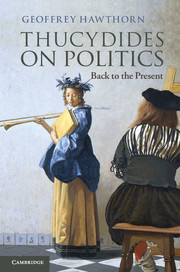Book contents
- Frontmatter
- Dedication
- Contents
- Preface and acknowledgements
- Chronology 545–323 BC
- List of maps
- Maps
- 1 The text
- 2 Writing power: Athens in Greece 478–435
- 3 Explaining the war: stated reasons 435–432
- 4 Explaining the war: true reasons 432
- 5 Judgements 431–430
- 6 Absent strategies 430–428
- 7 Speech and other events 428–427
- 8 Meaning and opportunity 426–424
- 9 Necessities 424
- 10 Interests 423–421
- 11 Emotion in deed 420–416
- 12 Purposes and decisions 415
- 13 Character and circumstance 414–413
- 14 One war 413–411
- 15 Back to the present
- Synopsis of the text by book and year
- Further reading
- References
- Index
13 - Character and circumstance 414–413
Published online by Cambridge University Press: 05 June 2014
- Frontmatter
- Dedication
- Contents
- Preface and acknowledgements
- Chronology 545–323 BC
- List of maps
- Maps
- 1 The text
- 2 Writing power: Athens in Greece 478–435
- 3 Explaining the war: stated reasons 435–432
- 4 Explaining the war: true reasons 432
- 5 Judgements 431–430
- 6 Absent strategies 430–428
- 7 Speech and other events 428–427
- 8 Meaning and opportunity 426–424
- 9 Necessities 424
- 10 Interests 423–421
- 11 Emotion in deed 420–416
- 12 Purposes and decisions 415
- 13 Character and circumstance 414–413
- 14 One war 413–411
- 15 Back to the present
- Synopsis of the text by book and year
- Further reading
- References
- Index
Summary
Thucydides says nothing about the early years of the men in his story or their lives outside politics; he allows Pericles and Archidamos, two of the most prominent, to die outside his text; and unlike other ancient writers, he uses none to make a moral point. The strictest reading of the strictures that he can seem to place on himself is that he writes individuals simply to signify their politeia in action. It has been said that some are more fully realised in the later parts of the text; that they have more individual character and produce effects that are more distinctively theirs. Some argue that this is a corollary of Thucydides’ increasing interest and attentiveness, others that it reflects the changing nature of events later in the war.
It is not easy to decide. The events as we know them are in large part the events as Thucydides describes them. Nonetheless, the last year and a half of the Sicilian campaign and the two years that followed did stretch Athenians as they not been stretched before; in part, one can suggest, because the politics of Athens in the later fifth century more generally opened themselves more to the vagaries of individual character than those of any other political community in Thucydides’ story, in part because the city was for four months in 411 divided against itself. No politeia would have been immune to the circumstances of war over three decades. But in Sparta and perhaps also in Corinth there were restraints of a constitutional and institutional kind (a distinction that was less sharp at this time than it came to be) that were not to be put in place in Athens until after the war. And in places like Macedonia, where power was between kin and decided by character alone, we know too little to say anything very much.
- Type
- Chapter
- Information
- Thucydides on PoliticsBack to the Present, pp. 184 - 201Publisher: Cambridge University PressPrint publication year: 2014



